The Janáček Theatre will celebrate its fiftieth anniversary on Friday by performing the premiere of Leoš Janáček’s opera Jenufa. The director of the performance is the current director of the National Theatre Brno – Martin Glaser. We spoke together about his production as well as the changes the theatre has gone through under his management and where the festivals Theatre World and Janáček Brno were heading.
You came to the National Theatre Brno with the aim of changing the conditions in and outside the theatre so that people would be happy and proud to work there. Have you been successful in achieving this?
I think I have. The atmosphere in the theatre is obviously different – more positive, friendly, full of hope compared with the situation two years ago, when I came here. It is good that even the new management of City hall understands that the theatre is underfinanced and that they want to support the theatre more. Many things in the theatre are being repaired and we have gradually put it together, which is good. We managed to increase wages especially for the opera ensemble, which used to be greatly underfinanced and I think that our effort to perform a different, more contemporary kind of theatre with stronger attendance is evident.
I have noticed that some of the more active employees have ceased to spread all the gossip from the theatre in public. Have you forbidden it or is there no need to complain?
It would be great if the other version was true. But at the moment I am trying to convince them that the dirty linen should not be washed in public. There was a strange atmosphere, where people did not trust their superiors, they tried to circumvent them and solve problems in places where there was no-one to help them and it was only harmful to the theatre’s image. The new management, which came here, tries to listen to them. And the employees are perhaps surprised that their wishes are suddenly heard and fulfilled.
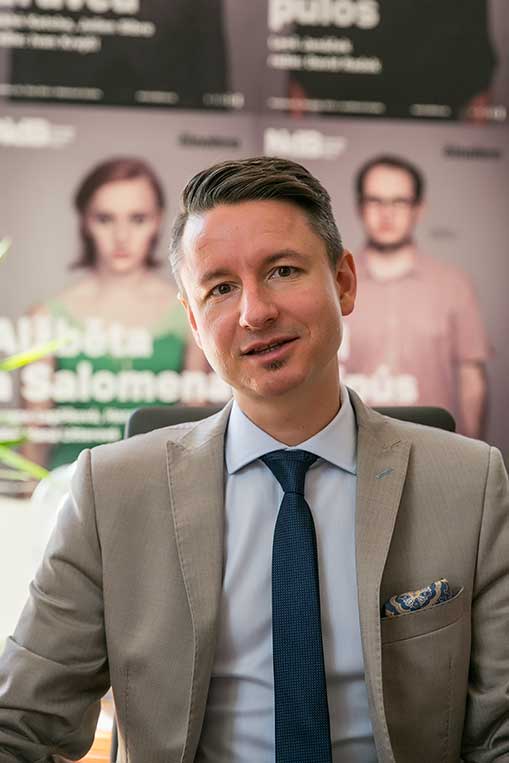 The theatre was underfinanced for a long time, but the fund management was not inspiring confidence and there was a strong ideological stream in the movement Žít Brno (“Live Brno”) which requested that the funds be taken from large institutions and given to independent art. What is it like to negotiate about fund increase if such views of the other party are taken into consideration?
The theatre was underfinanced for a long time, but the fund management was not inspiring confidence and there was a strong ideological stream in the movement Žít Brno (“Live Brno”) which requested that the funds be taken from large institutions and given to independent art. What is it like to negotiate about fund increase if such views of the other party are taken into consideration?
I admit that I did not even notice this position. The secretary Hollan was very forthcoming in the fact that he wanted to hear our real needs at the beginning of his time in the office. It was clear that the theatre is so underfinanced that the means were barely sufficient for daily operations. Therefore there were no funds to waste. And if Brno wants to have important European opera and ballet, it has to provide us with the European conditions, because these are the genres where the contracts are negotiated for international prices.
If the European wage situation was introduced here, would it not force out the current musicians in favour of the strong and well prepared foreign competition, for whom the financial compensation would be interesting? Won‘t the current badly paid artists lose their work?
The question is, if we want good artists or only Czech artists – I would prefer top artists in all ensembles. Especially opera and ballet are international everywhere and only a chauvinist has some issues with the ensemble being led by a Czech, Slovak or Tartar. If you look at the composition of our ballet, you will see that it is already international and when the director of the ballet announces an audition, nine hundred people apply and he chooses only the best of them. I am truly ashamed when I sign their pay checks and there is 600 EUR for young and promising Italians and Spaniards. It is no wonder that after our theatre pours money and energy into them, teaches them the repertoire, pays for their lectures, they leave for the closest German theatre two years later, where they, as soloists, have better wages than our director of the ballet.
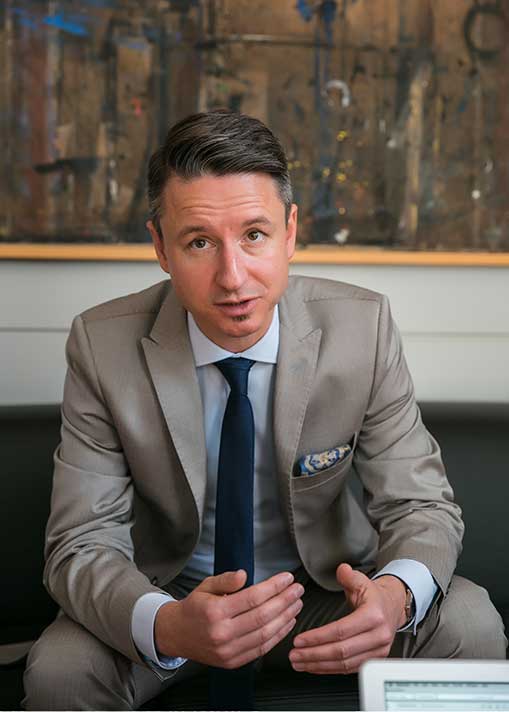 You are directing the Jenufa production for the 50th anniversary of Janáček Theatre opening. My question might sound a bit silly, but why are you directing? Why not a prominent author from Brno or someone world famous?
You are directing the Jenufa production for the 50th anniversary of Janáček Theatre opening. My question might sound a bit silly, but why are you directing? Why not a prominent author from Brno or someone world famous?
You have to ask the director of the opera who offered this opportunity to me. I agreed with my directors that I would gladly contribute to the profiling of their ensembles, but none of them must offer me directing of their production. Jiří Heřman is our best opera director, he knows my work and if he saw it beneficial that I should do an opera, then I feel honoured. We discussed what I should do for half a year and I was thinking about some current operas. Then Jiří came up with the idea that I would be a great director for Janáček’s work, and that really surprised me. And when he said it should be Jenufa, which is one of my three favourite operas, he pushed me against a wall. He offered me something, which I hadn’t even dreamed of, but at the same time he put me into a position of great responsibility: it is the 50th anniversary of the theatre’s opening, there is a great tradition of producing Jenufa and besides, everyone who has ever worked at Janáček’s Theatre, knows very well how Jenufa should be produced…
Eleven years ago David Pountney and his production failed, it was called Temelín...
I personally heard from many people that it was an experience of a lifetime. But the fact that the existing canonical image of how Janáček should be produced is very deadening. I think that it is some kind of a Brno relic, someone is always being cursed by it, but once we put for example The Makropulos Affair on stage with a magnificent study, then there is no-one sitting next to us in the auditorium at the fifth repeat performance.
Now you almost quoted Vladimír Morávek, he said something very similar in connection to the movie Nuda v Brně (“Boredom in Brno”)
If you look at statistics, you will see how many spectators came to the first years of Janáček’s festival for the real admission, how many repeat performances of Janáček’s titles are staged, then I think that it is somehow mandatory for Brno residents and Moravians in general: we know something about it, we know that we should hold it in high regard, but surely we will not flock there. To produce Janáček abroad is something more liberating, first you do not have the years old tradition behind yourself and second you have an open audience before you, which is accustomed to classical works being approached “non-classically”. If it is successful, people are thrilled and they do not point out that it is “ours” or that “difficult” Janáček.
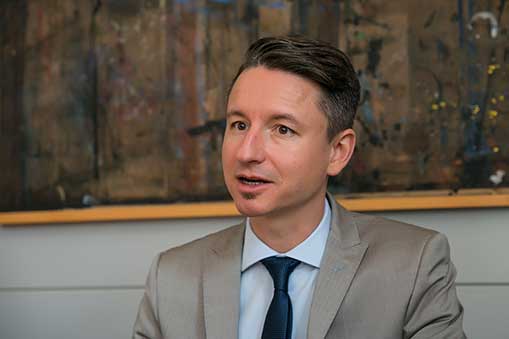 What is the key for your Jenufa production; is there a connection with all the apples on the stage?
What is the key for your Jenufa production; is there a connection with all the apples on the stage?
When I began to think about the production, in my head there was a question why this beautiful opera attracts so few people? I wondered to myself whether it was caused by the fact that this extraordinary tragic story is presented as a never-ending depression from the beginning. Everything happens in twilight, everyone is dressed in grey rags and from the moment the curtain is lifted, the heroes are destined to end badly. I wanted to make it the other way around, which is influenced by my infatuation with Moravia. What happens to the heroes is not caused by some higher power. The order of things they aim for is in fact positive and good, but they drag it to hell through their own doing. Even their bad interaction reminds me of today. Therefore we hurled the characters into a very contrasting environment. If they experience an inner hell, we put them into a Moravian paradise. This was only a step away from an apple orchard at a period of great yield, but of course it brings other connotations, the tree of knowledge of good and evil, the sinful apple, etc. This was the base for the Jenufa production.
In Ostrava you directed Schumann’s Genoveva from the romantic Germany, in Brno you are directing Jenufa from the veristic Moravia. Which is closer to your heart?
Jenufa is my greatest joy while working in opera. I would not choose the dramatic Jenufa, I have a problem dealing with these village dramas, and I wouldn’t know how to lead the actors. But Janáček performed a dramaturgical miracle with the play by Gabriela Preissová, he removed everything insignificant and every word has a clear meaning. The logically constructed story is a perfect base and as a director I can use all the magic I know to experience the feeling of freedom. And the fact that it is accompanied by genius music is a gift from the heavens.
Does the opera theatre reach beyond its closed circle of fans?
In Europe it is opera which dictates the production trends. Maybe it sounds a bit naïve to say it like this, but thanks to the fact that librettos are often flawed and weak-minded, the producer is required to put more work into it. Music allows a wider abstraction; therefore the visual part also has a greater chance to shine.
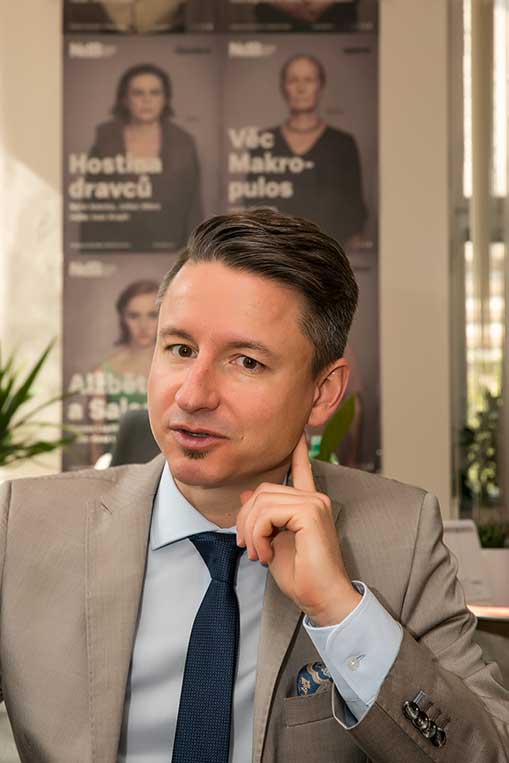 You spent 15 years working in České Budějovice, and you were head of drama for eight years. Are you a man of long term relationships?
You spent 15 years working in České Budějovice, and you were head of drama for eight years. Are you a man of long term relationships?
Yes, I am. Before I decided to leave Budějovice I had been thinking about it a lot, because I didn’t have to. I announced I would leave two years in advance, because the time there felt unfulfilled, and because I feel the need to belong somewhere, to care for someone and to build something. Perhaps I would like to care for myself, travel between Czech theatres and have more time for reading, writing and thinking. Then the offer from Brno came and I was pulled in by my urgent need to create, revive something, because when you see something grow because of you, it is a great joy.
You have said that public theatre is there to say unpleasant and provocative things. Can the public institution dependent on politicians deal seriously with political theatre?
It should have the courage. We shift between the imaginary Scylla and Charybdis, where the first are the politicians and the other are spectators. We have to revive the spectators’ trust in the theatre so that it would have meaning to visit the theatre. But the Czech audience is not accustomed to political theatre. They don’t need it and they don’t want to be unsettled by the theatre, the recreational and entertaining functions are in greater demand that the one, which should be provided primarily by the public theatre.
But when the Janáček Theatre presented, as part of the Tanzbrücke festival, the strictly political dance performance Ulrike Meinhof, which drastically dealt with the leading representative of the militant group Rote Armee Fraktion, it was a great success and there were many positive reactions.
I would be really glad if the directors of the ensembles engaged in such things. At least in the drama section there is a hint in the form of a play, which is called Spílání Brnu (“Berating Brno”).
Do you consider such – at least unsettling – matters your moral responsibility, even if you could end like the dramatic studio in Ústí nad Labem did?
Absolutely.
It is a bit strange that in the Czech Republic the only large political show is performed by Daniel Landa. Would you allow him into the Mahen Theatre once again?
Absolutely not.
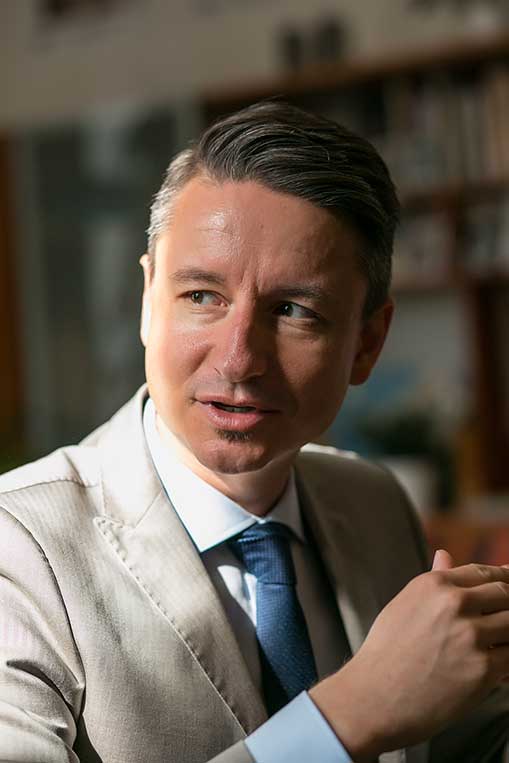 One of the total fiascos of the Brno cultural life was the Theatre World festival, which took place with no public interest regardless of the performance quality. The directors of the individual contributory theatres replaced one another in its management, and since this year it has been steadily placed in the National Theatre. Did you want it, or did the city council force it upon you?
One of the total fiascos of the Brno cultural life was the Theatre World festival, which took place with no public interest regardless of the performance quality. The directors of the individual contributory theatres replaced one another in its management, and since this year it has been steadily placed in the National Theatre. Did you want it, or did the city council force it upon you?
When I came to Brno, I wanted to revise all activities the theatre was involved in. When I came to the item “Theatre World”, I was slightly shocked. I knew only a little about this festival, that it was created out of spite to the Czech theatre community, that it bounces between extremes, from honouring Havel to honouring the comedy theatre and it is illegible for a long period. And that it did not reach out to the professional and audience public. Next to it there was the Janáček festival, which has the chance to be something unique, what cannot be anywhere else in the world. In other words, if we manage to make Theatre World into a good festival, it will only be one of many festivals; we will never catch up with the history and finances of foreign festivals. But no one has Janáček. Therefore I found it only logical to focus on only one thing and do it properly. I arrived at the first meeting of the Theatre World board at a moment, when they had finished the concept for honouring the comedy. My colleagues were discussing a further continuation and it seemed that they were not happy that the project would continue. I began talking to them about the possibility of investing the time and energy into the Janáček festival and I managed to convince the dramatic theatres that it would be rational to be “absorbed” into the Janáček Brno festival.
On the outside, however, the situation looked the other way round – that Theatre World would absorb the Janáček Brno festival.
The avalanche I released was bigger than I could imagine, because I didn’t know the clear attitude of the Janáček musical community. For them Theatre World was a bogeyman and a money eater and I, as a dramatic director, represented for them a person unable to appreciate Janáček. They came to the conclusion that I want Theatre World to absorb the Janáček festival. My mistake was the fact that I did not discuss this with both parties at the same time and did not bring them to one table. I started on the wrong foot. The result is that Theatre World was transferred to the National Theatre Brno, which should have been only the first step. We took a lot of work upon ourselves, but we managed to put together a team of young enthusiastic colleagues and a very good program. The Vígszínház from Budapest, Volkstheater from Vienna, the state ballet from Munich and the Maxim Gorki Theater from Berlin will be present. These are tremendous achievements. But now the most difficult task of convincing the audience to come awaits. At the moment it does not look so good, because the label Theatre World Brno is not very trustworthy. But if the political to have this festival in the future exists, we cannot be dissuaded from the start. It is important to bring quality performances, so that the audience and our authors could have an image of the European theatre concept. The audience usually does not travel to see theatre, but the current European image should be known, so that they would not be bewildered by something, which is twenty years old.
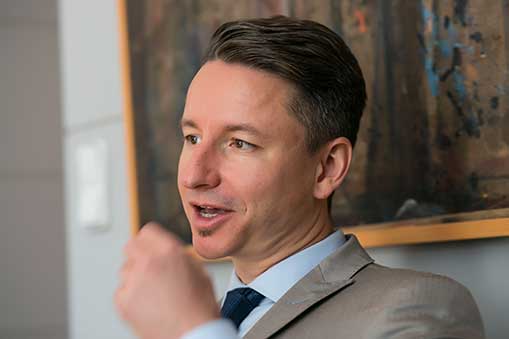 This year Theatre World will practically continue the Moravský podzim (“Moravian Autumn”), will you let it continue the Janáček Festival Brno next year?
This year Theatre World will practically continue the Moravský podzim (“Moravian Autumn”), will you let it continue the Janáček Festival Brno next year?
We have received instructions from the city council saying that Theatre World must have a term that would not closely follow any profile festivals, which the Moravian Autumn and Janáček Brno are. The term for Janáček Brno is clear, it is the beginning of October, and thus the DSB 2016 (Theatre World Brno) will humbly return to the end of May, beginning of June. There are still students in Brno, the weather is nice and there is a chance of having some foreign audience too.
Your initiative placed Janáček Brno into the Czech Association of Musical Festivals, while I would say that the more progressive and open festivals rather left this association and founded the Czech Festival Association. What led you to this step?
This new association only has a few members at the moment, its website is nowhere to be found and after a few months of existence they proclaim that they struggled for years for a meaningful program of festival support, which, however, is done by the AHF. I would say that it is better to fight for better conditions along with the genre related large festivals like Prague Spring or Smetanova Litomyšl. Janáček Brno and The Colours of Ostrava do not meet each other much. Janáček Brno must also have the appropriate budget; currently it has only a fraction of what would be allowed by more progressive development. I know that the management of the Czech Association of Musical Festivals is fervently working on the fact that the premier festivals would have standard European conditions for their operation. At the moment we are not only planning for 2016 but at the same time we are planning for 2018, because I would rather not repeat the situation, when there was nothing agreed upon for the next year. The preparation for the new program was started with a great delay and we did not even know, what finances will be provided for that year. We had to hope that it would be at least the same as the year before. This is not the way to make a top festival, let alone develop it further.
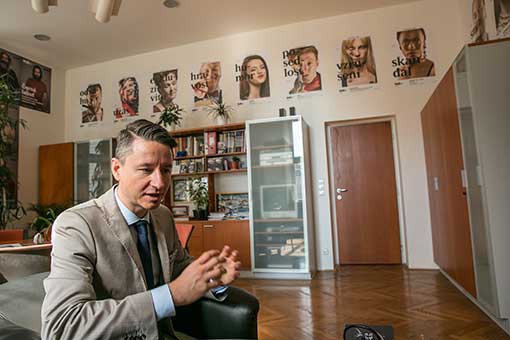 You mean that after 2014 nothing was prepared. However, Jiří Zahrádka left the dramaturgic board – he was formally a regular member, though in fact he created the entire dramaturgy. Was there really nothing prepared and did he just take it with him when he left?
You mean that after 2014 nothing was prepared. However, Jiří Zahrádka left the dramaturgic board – he was formally a regular member, though in fact he created the entire dramaturgy. Was there really nothing prepared and did he just take it with him when he left?
I regret that our relations with Mr. Zahrádka are a bit tense at the moment, and I hope to improve them. I believe that Mr. Zahrádka will understand that our team cares for Janáček as much as he does and that we are able to prepare as good a festival as the one, which was prepared under his management. Doctor Zahrádka initiated the disbanding of the dramaturgic board in June 2014. I will not hide that I was glad about it: I found it only logical that if there is a new management of the theatre, the dramaturgic board should be renewed. I invited Mr. Zahrádka onto the new dramaturgic board, because I think of him as a crucial expert and a person, who dedicated a great amount of energy, time and work to the festival. Unfortunately the major part of the dramaturgic board wanted to work in a different manner than the one, which would suit Mr. Zahrádka. Therefore he decided, after the first meeting of the board, to resign and we have invited other experts. At the moment we are working fervently and the results of our work will be shown in 2016. However, the program looks promising; therefore I look forward to it.
The new board members Jan Špaček and Josef Herman tore into each other on the Divadelní noviny (“Theatre Newspaper”) pages, which is actually the only thing apparently visible so far…
The conflict is very simple indeed. Some board members with an academic background believe that a festival is only successful if its topic is defined in advance and is fulfilled. Some members of the dramaturgic board who have practical cultural operation experience admit that a topic is important, however, they know that it can be arrived at inductively – when speaking about the real offer of performances and concerts. The festival will have its theme in 2016 too; however, we wanted it to resonate with the lives of people in this place to show them through this festival that Janáček was a living author and not a figure from a museum. We did not want to discuss another theme not discussed yet by experts on Janáček. Nonetheless, the discussion was inevitable and when we got to practical things Josef Herman and Jan Špaček are able to cooperate in a normal way. We talk about performances which should be brought here, what should be played and ordered from visiting ensembles and orchestras. It is natural that prominent figures have escalated viewpoints and it is good; nevertheless, it is bad if they are not used to discussing them. Without this fundamental willingness, it is hard to work in collective ensembles.
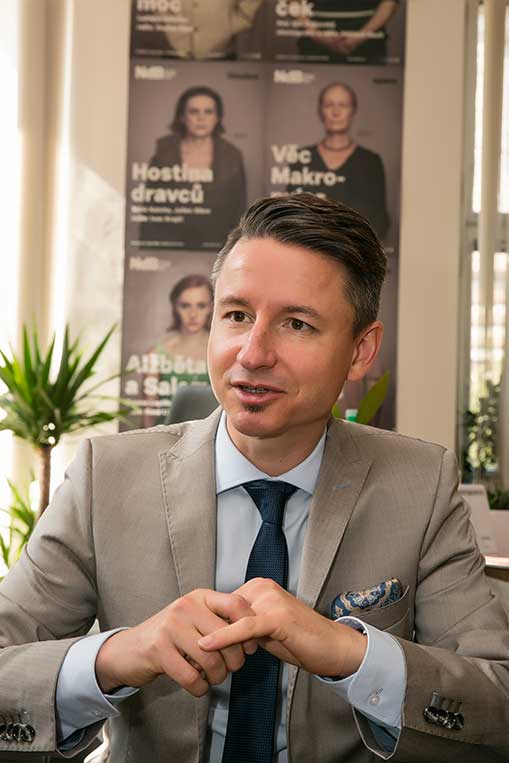 I have to say, however, that I regret Jiří Zahrádka's absence on the board…
I have to say, however, that I regret Jiří Zahrádka's absence on the board…
I feel the same, actually, and the whole situation when emotions were amassed, the board was dishonoured and I had to prove at the Municipal Authority that we were working; and all this happened even before we had had an opportunity to present some results. I could not do anything but to ask Mr Zahrádka to join the new dramaturgic board. I knew he was a bit difficult from the point of view of communication; however, I believed that we could get over all this if there was mutual good will. In a collective body, especially if there are such prominent figures, one cannot act in an authoritative way. A theme and programme cannot be just announced and when other people say they want to talk about it, you cannot simply leave. I was a bit sceptical myself and I did not believe that a topic related to Janáček and social humanism would bring an audience and I answer to the founder and it is my responsibility to make sure the festival would be successful and praised by the audience too. Nonetheless, I do not want to get back to that. I strongly believe that the emotions will calm down and we will cooperate with Jiří Zahrádka. It is important now that the festival keeps running and stays at the National Theatre. Only the synergy between the theatre and the festival can take us to the first European league.
Would you ever like to get back to the “zero” year of the festival in 2004 when all Janáček’s operas were played?
That would be awesome but we have been bound by the festival budget. If we all have ambitions to bring top European opera theatre and prestigious symphonic ensembles and first-class musicians here, it will be necessary to increase it. It is a great success, however, that under the existing conditions we can introduce two big foreign productions every year. It is a paradox that Janáček Brno, which should be the flag ship of Brno, gets seven million every other year, i.e. less than Moravský podzim (“Moravian Autumn”), even though expensive complete opera productions are brought here – orchestra, soloists, choir and decorations – when even the cheapest ones, such as Zagreb last year, costs several million per evening. And then there is Divadelní svět (“Theatre World”) which gets seven and a half million every year while dramatic plays are significantly cheaper. Which means that Divadelní svět could bloom magnificently compared to Janáček when taking its budget into consideration.
You have already mentioned that you feel the need to belong somewhere, to build something and to take care of something. You have been building the theatre in Brno, you are in charge of it, do you feel you belong there?
I do not know, only time will tell. I am satisfied here now and I do not feel the need to ponder my personal feelings now.




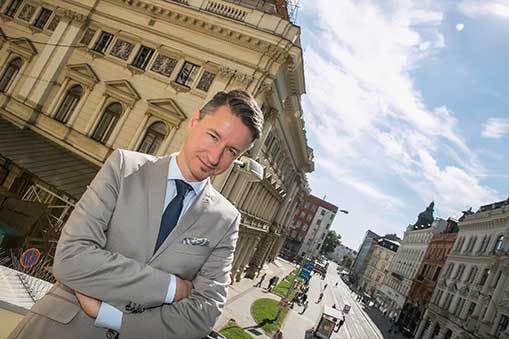



























No comment added yet..